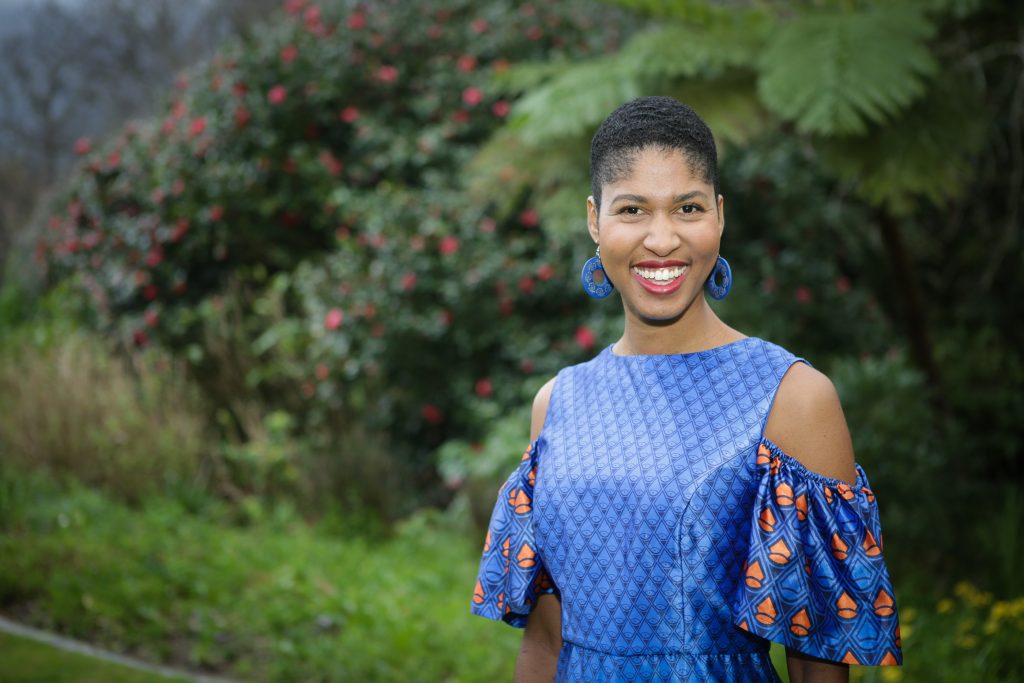In this series of interviews. I ask scientists, engineers, and ethicists how technology might change our future. We had these conversations during the research for my book, Welcome to the Future (Quarto, 2021).
Interview 11 – Danielle Wood, aerospace engineer and ethicist
Dr. Danielle Wood leads the Space Enabled Research Group at the MIT Media Lab in Cambridge, Massachusetts. Her team’s goal is to use space technology and designs enabled by space to advance justice here on Earth. She gave a TED talk in 2018 titled “6 space technologies we can use to improve life on Earth.” She has also worked as an engineer at NASA. We spoke in December 2020. Her ideas convinced me that we should not use the words “colony” or “colonize” to talk about space exploration. To find out more, here are two articles Dr. Wood has written about the ethics of space exploration:
Danielle Wood. “On Indigenous Peoples Day, Let’s Commit to an Anticolonial Mindset on Earth & in Space.” MIT Media Lab, October 12, 2020
Danielle Wood. “Creating Our Sustainable Development Goals for Mars.” Philadelphia Museum of Art, Walker Art Center, and The Art Institute of Chicago, December 2, 2020.
In your TED talk, you mention a common belief that space is only for the elite few. Why is this an incorrect assumption?
The important thing to understand about who is involved with space is that every single country in the world is currently involved with space in lots of different ways. It’s nice to look back at history of how humans got started going to space. It’s actually a very positive history in the midst of a very complex, somewhat violent history. So during the 1960s countries like England as well as countries in Europe had control of other countries as colonial powers, which I think is ethically wrong. In this time period of the 50s and 60s, a number of countries decided that they did not want other countries to rule them any more. Right before we see humans putting things into space, we see a process where a number of countries especially in Africa and parts of Asia, like India and Malaysia and Singapore, were deciding that they wanted to have national freedom.
During that same time period, countries that were experimenting with putting things into space also gathered together dialogue opportunities to ask, how should humans behave when we have activity in space in the future?
The United States had used an atomic bomb to help end World War II. That led to an awareness around the world that humans had the power to use technology to kill a lot of humans at once. Which is very scary. During the 50s and 60s, people were wondering if this would happen again. Would we have a lot of new wars that would lead to more use of atomic bombs? It was quite a serious question we had to ask as humans. Will we do this?
When countries first started to operate rockets to send to space, it was very similar to the technology used to send an atomic missile to another country. So this could have led to a World War III. What’s exciting is we didn’t have World War III. Space activity didn’t lead to new wars, and we didn’t see a lot of countries being afraid to talk about how we can be peaceful in space.
Instead, what we saw is that some good choices were made. Countries came together, including the Soviet Union and the United States and countries around the world. They gathered and created set of treaties and a United Nations committee to talk about how we can have peaceful activity in space.
A treaty is when multiple countries that are all ruling themselves sign a document that says, we agree to abide by a set of rules of behavior. They can take it farther and say this treaty will become a part of my law in my own country. There are five different treaties written in this early time period of space. These early treaties requested that we don’t put nuclear weapons into space or weapons of mass destruction that could cause a World War III. They also had the fact that space is the common heritage of all humankind. It really shouldn’t be colonized by one country.
So there is currently a committee on the peaceful use of outer space. And right now there are about 90 countries that are members of this committee. And they’re from all over the world. They’re from Africa and South America and Asia and East Asia and Europe and the Caribbean. We have input from all over the world about how we operate in space. Over 60 countries have space agencies and operate satellites. People sometimes assume that space is expensive and requires having a big national space agency like NASA. But that’s not true. Around the world we see countries of all sizes and shapes getting involved with operating and building satellites or being involved with using the tools of space technology to help address needs on Earth.
How do we avoid making the mistakes of colonization again when it comes to building settlements in space? And how can we make sure that in our space settlements, we’re not making mistakes involving racism, gender inequality, or other injustices?
I would like to say that humans will continue to make the same mistakes unless we decide not to. What’s exciting is that this current generation has the ability to think very clearly not just about issues of racism for example, but about sustainability in general. There are a set of ideas I like to bring together under the big umbrella of sustainability. Sustainability would mean the ability to live in such a way today so that we leave behind our Earth and our relationship with other people in a way that is fair and kind to future generations rather than creating problems for future generations. I consider it having social and economic and environmental features. They are all interrelated and all need to be done in a way so that we are not regretting what has been done.
I teach a class every fall semester titled, “Can space enabled designs advance justice and development?” We start by reading 500 years of world history. Because really the last 500 years is when we decided how to live in the current modern era. In the 1400s, a few key things happened. Before this time, it was not widely known across the world how to travel across oceans by boat. So in the 1400s, the Portuguese, helped figure out and demonstrate the power–economically and militarily speaking–of traveling around the world by boat. They went from Portugal, around Africa, into the Indian Ocean. They started what became the slave trade. They traded people across oceans. Why did this matter? Because those who had the big boats started to have a lot of power in the world.
We see a relationship between Africa and Europe and the Americas form. This leads to a process of colonization where European countries are colonizing the Americas and the Caribbean, and of course Africans are being kidnapped, by other Africans sometimes, and moved to the Americas as slaves. And all kinds of new technologies form. There are boats, but also the plantation system for farming, which is a technology that is used to produce cash crops like cotton. The cotton gin makes it affordable to take this cotton and put it into textile mills. The industrial revolution starts to build really excellent factories that produce products. Technology in these cases was enabling opportunities for treating people poorly. Countries and leaders that had strong military and economic capabilities, they found they could exploit and take advantage of people with less military power at the time or less economic power at the time. And if they were able to get away with it, they chose to. This is a common pattern that continues today. Even today, to be honest, the US continues to own land all around the world where we are still, in a sense, colonizing. We have land in American Somoa and the Virgin Islands. Some folks who live in those places don’t have voting rights in the full sense that other US citizens do. They can vote in some elections but not others.
So we read about this history then we ask, how can we take opposite approaches in the future? We have important opportunities in the space era right now. New technologies are being invented or improved. We’re finding out ways we can use space technologies to have activities in what we call low earth orbit. It’s between 500 km up to about 2,000 km. In the next few years we’re going to see a lot of small satellites that are affordable to build. We’ll see new smaller space stations and people are going to be doing research there. And we’re going to see lots of different ways to use satellites for communication, positioning, and observing the Earth. We also need to be careful to avoid putting so many objects in space that we create a concern about debris and collisons.
The second angle is that humans want to go to places beyond just orbiting the Earth. Twelve men of European descent, American citizens, got to travel to the moon. Currently we do see new plans of governments and companies to go do projects on the moon. The next question would be, when we are on the moon, or on asteroids, or on Mars, what behaviors should be in place?
We did have some treaties. It’s already laid out in various international laws that one country should not harm the activity of another country or get in their way. And every time someone goes to space they should follow the rules of the country that sent them. If you’re an American company or American mission, you’re under American law. But some things are not quite as clear. In my class this year, we asked under what conditions it’s legal for someone to take an object like a rock from the moon and bring it back to Earth and sell it for profit. This is addressed somewhat in the treaties, but there is some legal ambiguity.
It’s a very important question because we want to find out, for one, are we going to preserve places like the moon as natural environments? So you think about the Grand Canyon for example. It’s a beautiful park and we’ve agreed we’re not going to put shopping malls or stores there or take a bulldozer and destroy it. We’re going to maintain it as a naturally beautiful place. I would present that the moon is a naturally beautiful place. The moon has very slow changes geologically. It changes when rocks come and hit it. There have not been a lot of human changes of the moon’s surface. Do we allow that in the future, and under what conditions? Or should we preserve it as a minimally altered location?
What is your thought on that personally? Is it fair for someone to decide to set up a settlement on the moon or Mars, or should we preserve them as they are?
There are a number of questions that should be asked for each location. The moon has no atmosphere. It doesn’t have wind, whereas Mars does. Mars is a more active planet and it’s much bigger. The moon’s actually quite small. It could be destroyed faster if we’re doing things like mining. I have to say that I think we’re going to do these things. I don’t think it can be stopped. The current international law we have does not prevent them from doing it.
But I would personally prefer to see the moon more like a national park and less like an industrial mine. Keep in mind there’s another angle to consider. There are a number of cultures on Earth, many indigenous cultures but not only,that consider the moon a sacred place. The moon is very linked to the Earth. Some cultures consider it a sacred place or a place that is part of Earth. There already have been cases where activities that have been done on the moon have offended existing communities on Earth who wished it hadn’t been done. I would like to see respect for different cultures, that we consider and listen to the points of view of others, and particularly of indigenous communities.Their view is bigger than mine because they have a whole community-based view on it.
If you think about Mars, it’s bigger and still evolving. On Mars, the question is can we find evidence of past life? On Mars, there’s a very different question, how do we consider an appropriate way to use it? It has locations that I would consider beautiful and naturally interesting. One of my students did a project this year, that says before we determine how to preserve or use [space resources], we should consider a number of different concerns. One is, will this offend a group culturally? Another is, are there economic reasons, like doing mining? Another is, are we going to have any scientific regret, like meaning might you take an action and later wish you’d allowed better science? Another point of view is, whatwould be the aesthetic beauty of that place? And is it worth maintaining? We need a better way for countries to review these points of view. We also want to see if we can include indigenous communities in this dialogue, because they may have a different view than the countries they are a part of.
Most of my chapter is about how we can set up a settlement. But a lot of your work is about how space can benefit people on Earth. How can building a settlement on Mars or on a space station benefit people on Earth?
I mentioned earlier that I think of sustainability as having these three components – including what we do from the point of view of economics, our social relationships, including how we treat people who are different from us, as well as the environment. We need to figure out how to practice that wherever humans are, whether they are on Earth, in orbit around the Earth, or on the moon. Wherever we go, we have to keep asking these same tree questions. We have made a lot of mistakes in sustainability here on Earth. We are failing in many ways. We have climate change that we are not yet ameliorating. We are continuing to produce a lot of greenhouse gas and pollution. This is very concerning. We need to keep asking the question, how do we get better at that? In space, we haven’t made quite as many mistakes yet.
I like to tell kids that the moon and Mars are places where we are not starting with quite as many past mistakes.
On Earth, we are always creating trash. And we don’t know where to put it. We create trash that goes into landfills. We put a lot of plastic trash into the ocean and we essentially put trash in the atmosphere in the form of greenhouse gasses. What if when we go to Mars, we don’t have trash? For example, in my house, we have a trash can. What if we didn’t have it? What if I only had a compost bin and a recycle bin? What I want to propose is we can start imagining that life on a place like Mars can’t really afford to have trash because you need everything! You’ll need to use whatever resources are available because you’re limited.
I like to ask kids, could they start to imagine how to live without trash, where everything we have is some kind of tool that can be used, and we either compost or recycle it or turn it into input for a 3D printer or something. What if we learned how to do that for Mars, then came back and learned how to do that on Earth? Our trash could all become useful energy or materials.
What about the potential for social change that begins in space? On the ISS people from different backgrounds are all living together. Does that situation teach us better ways to live together?
I appreciate this question. Some people are very optimistic and say, in space people seem to overcome Earth-based prejudices. Of course the ISS is an amazing story. Countries came together, the US and Soviet Union were enemies that chose to work together. I do want to note that the ISS was designed to be a nonprofit environment. It’s been great. But what we’re going to see now is space activity driven by governments and public companies. When companies are driven by profit, they don’t necessarily have the same ways of engaging as more educational or science-driven activities. So I do think we should be very careful. We can’t assume that just because people are in space, they’ll behave in ways that are more egalitarian. It has to do with why they are in space. When companies go to space for profit, they’re going to behave just like companies on Earth that are seeking profit. If you’re working under a capitalist way of thinking, where the goal is to make money, that doesn’t encourage treating people fairly or having better relationships.
Any last words?
I’m so glad to get this kind of discussion going. I hope kids grow up thinking it’s normal to keep space healthy and without trash and with fair relationships.


